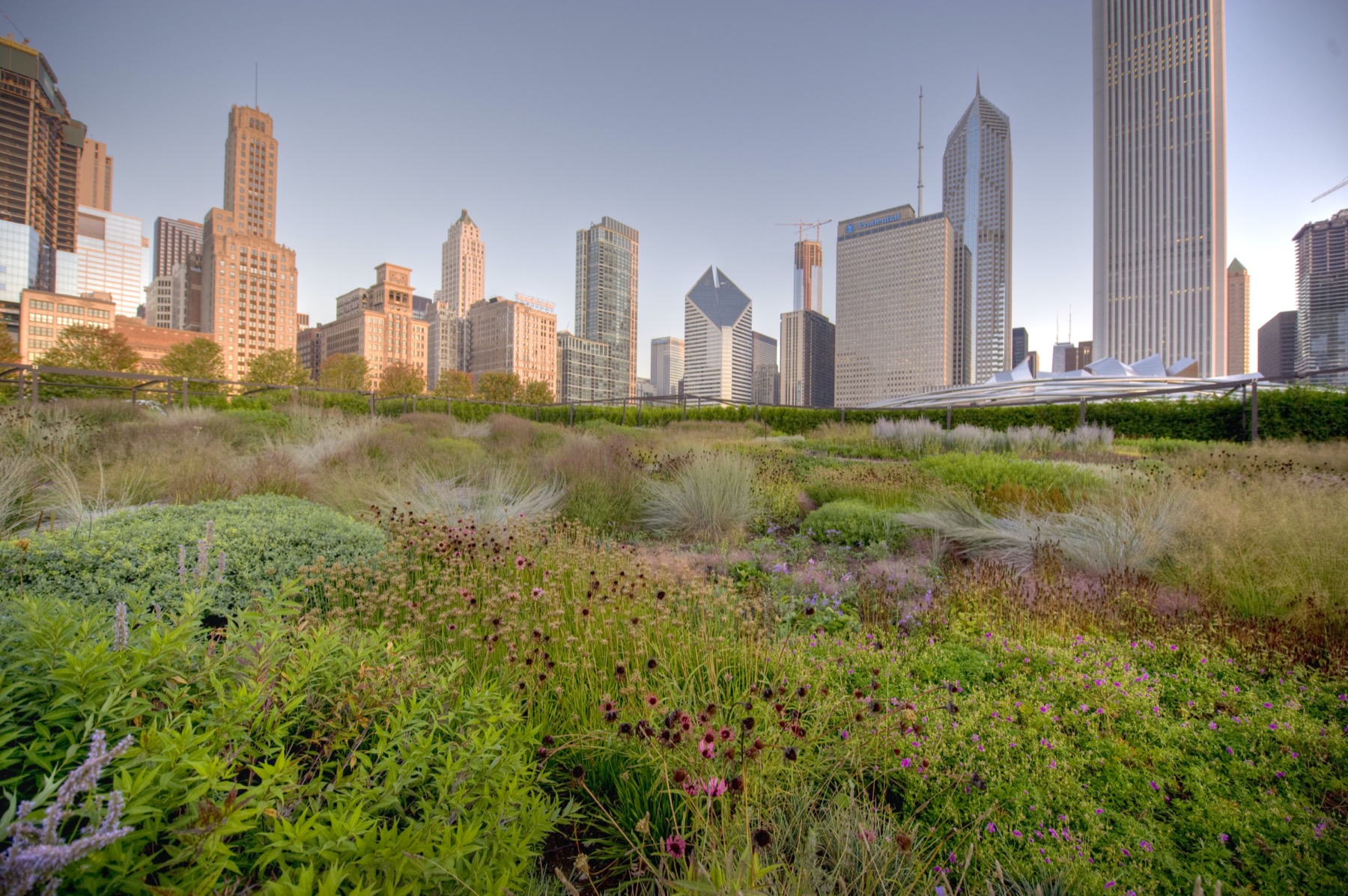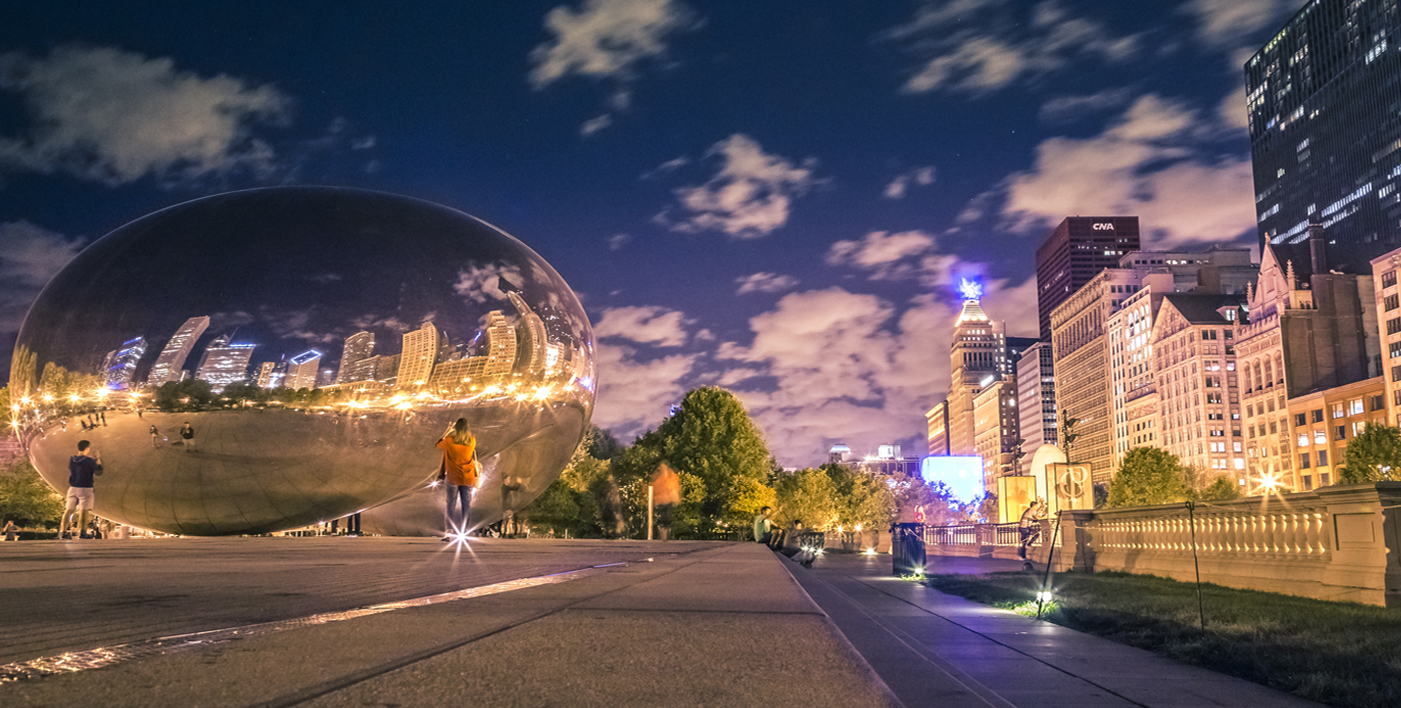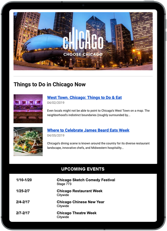The city of Chicago is open across industries, in accordance with state and federal guidance. While all capacity restrictions have been lifted, many Chicago establishments continue to follow additional safety measures, such as masking, social distancing, and enhanced cleaning. Learn more about the latest guidelines and best practices for various industries, including retail, hotels, dining, theatres, and beyond.
- Airports
- Restaurants and bars
- Hotels and lodging
- Museums and attractions
- Public transit
- Performance venues
- Retail
- Parks and outdoors
- Salons, spas, and fitness centers
Airports
Chicago is home to two international airports that connect travelers to more than 200 destinations around the world. O’Hare International Airport and Midway International Airport have both implemented stringent health and safety protocols to keep travelers safe and now offer the most comprehensive airport testing program for COVID-19 anywhere in the country. Take a virtual tour of our airports’ latest safety procedures.
COVID-19 testing
- Chicago offers in-airport COVID-19 testing at both O’Hare and Midway International Airports for travelers and airline employees
- Both airports conduct PCR tests (results within 72 hours) and rapid tests (results within 20 minutes)
- O’Hare Airport offers a walk-up, pre-security testing site adjacent to the terminal core, as well as a drive-up site in a remote parking lot
- Midway Airport offers a walk-up testing site within the terminal.
Physical distancing
- Promote social distancing with the use of decals, static and digital signage, and announcements
- Limit passengers on airport shuttle buses to 15 or less
- Limit concessions hours and availability; removed certain tables and seating, added distancing floor decals near registers, installed plexiglass at registers, posted additional distancing signage to increase spacing and reduce density crowding, designated single entrance and exit lines to control and improve the flow of passengers
Cleaning and sanitation
- Increased frequency of surface cleaning in high-traffic areas, utilizing virus and bacteria-killing disinfectants
- The installation of more than 300 additional hand sanitizing stations, along with a regimented refill schedule
More resources
- Chicago Department of Aviation details new sanitation and distancing guidelines
- U.S. Travel Association offers healthy travel practices and guidance for travelers
- Centers for Disease Control and Prevention features the latest global updates and travel information
Restaurants and bars
The restaurant industry has always been at the forefront of health and sanitation practices. And Chicago restaurants and bars have been hard at work implementing the latest recommendations to keep guests and employees safe, like introducing contactless options, using protective gear, and rearranging their physical space to increase social distancing.
There are currently no citywide mask or vaccine requirements for restaurants, but some establishments may still require masks or proof of vaccination. Learn more about the food service guidelines for the city’s restaurants.
Cleaning and sanitation
- Provide disposable table items where possible (e.g., menus, containers, condiments)
- Clean and sanitize non-disposable table items after each use (e.g., menus, containers, tables, chairs)
- Ensure hand sanitizer or hand washing facilities are readily available for both customer and employee use
- Provide health and safety training related to COVID-19 and cleaning procedures for employees
- Thoroughly clean and sanitize entire facility prior to opening and throughout the day
- Clean and sanitize highly touched front of house areas every 30 minutes
- Monitor, clean, and sanitize restrooms regularly
Physical distancing
Note: These guidelines are not mandatory and are up to the discretion of individual establishments.
- Limit dining to no more 10 people per table, unless all individuals are fully vaccinated
- Employees and diners encouraged to maintain 6 feet physical distancing
- Space tables 6 feet apart, decommission tables, and/or add physical barriers (e.g., Plexiglass) between tables if they can’t be moved.
- Use impermeable barriers where 6 feet distancing is not possible (e.g., counters, service tables, registers, etc.)
- Clearly mark any area where guests or employees queue (e.g., registers, waiting rooms, restrooms, etc.) with appropriate physical distancing guidance
Protective gear
- Employees wear face coverings at all times
- Face coverings for guests when not seated and dining
- Provide proper PPE training (how to wear, properly remove, etc.) to employees
- Provide gloves to follow standard food handling guidelines
More resources
- Illinois Restaurant Promise by the Illinois Restaurant Association
- Restaurants & Bars for Outdoor Dining Guidelines by Illinois Department of Commerce & Economic Opportunity
- Restaurant Reopening Guidance from the National Restaurant Association
- Guidance for Restaurants & Beverage Vendors Offering Takeout or Curbside Pickup by the Occupational Safety and Health Administration (OSHA)
- Food Safety and the Coronavirus by U.S. Food & Drug Administration (FDA)
Hotels and lodging
Our hotels are meant to be your home away from home while visiting Chicago. And our hotel community is doing everything it can to make sure you feel safe during your stay. The industry has gone above and beyond adopting the latest health and hygiene standards, including increased social distancing and frequent sanitation of rooms and common spaces. The City of Chicago hotel and accommodations guidelines include the following standards.
Cleaning and sanitation
- Provide training to all employees on enhanced cleaning and sanitizing procedures
- Ensure frequent hand washing among employees and customers
- Provide hand sanitizer and/or wipes for guests at key locations (e.g., lobby, elevator areas, etc.)
- Provide amenities (e.g., hand sanitizer, soap, wipes) to the guest rooms upon request
- Increase cleaning frequency in public areas, focusing on the high contact surfaces
- Provide daily housekeeping service upon request only (when a guest is not in the room)
- Remove room from service to undergo deep cleaning protocol if occupant tests positive for COVID-19
Physical distancing
- Ensure guests socially distance in areas of congregation (e.g., in lines, lounges, and if practical, elevators)
- Ensure work stations are 6 feet apart or provide appropriate barriers/shields
- If practical, promote electronic/keyless/cashless/paperless check-in
- Replace traditional room service with knock and drop program, offer contactless/pre-packaged food options
Protective gear
- If practical, gloves will be worn as appropriate for work (e.g., food handling)
- Housekeepers may wear face coverings, gloves, and appropriate eye covers
More resources
- Hotels Guidance from the Illinois Department of Public
- Clean + Safe Guidance for the Hotel Industry by the Illinois Hotel & Lodging Association
- Enhanced Industry-wide Hotel Cleaning Standards from the American Hotel & Lodging Association
- SafeHome initiative from the Vacation Rental Housekeeping Professionals
- Enhanced Cleaning Initiativefrom Airbnb
Museums and attractions
Chicago is home to an array of iconic attractions and world-class cultural institutions, including acclaimed art collections, hands-on science centers, breathtaking observation decks, and more. As these establishments welcome the public again, a number of physical distancing and sanitation guidelines will be put in place to ensure the safety of all visitors as they enjoy the city’s many attractions.
Cleaning and sanitation
- Employees frequently disinfect museum facilities
- Ensure frequent daily and overnight cleaning of work surfaces and high touch points
- Sanitation stations readily available throughout facilities
- Interactive experiences may be adapted or temporarily closed to reduce contact.
- If applicable, ensure hygienic interactions with touch surfaces (e.g., provide gloves, stylus), or close off access
- Ensure audio equipment for self-guided audio tours is thoroughly cleaned and sanitized between users
- Where possible, use QR codes for audio clips to allow guest to use personal devices for self-guided audio tours
Physical distancing
Note: These guidelines are not mandatory and are up to the discretion of individual establishments.
- Museum movement flow controlled to prevent overcrowding and promote physical distancing
- Group tours temporarily discontinued to promote social distancing
- If practical, provide physical barriers where social distancing is not possible (e.g., box office / ticketing)
Protective gear
- In any indoor common spaces, face coverings may be worn by employees and visitors
More resources
- Guidance for Gatherings and Community Events by the Centers for Disease Control and Prevention
- Information for the Museum Field on the COVID-19/Coronavirus by the American Alliance of Museums
- Information for Disinfecting Cultural Resources by the National Center for Preservation Technology and Training
Public transit
Chicago’s public transportation system is an easy, affordable way to get around the city. As the nation’s second-largest public transportation system, the Chicago Transit Authority (CTA) takes passenger safety seriously. They’ve introduced a variety of new guidelines, including an enhanced cleaning regimen and passenger limits, to ensure a healthy and comfortable environment on all their trains and buses. And the regional Metra rail lines are going the extra mile with cleaning, disinfecting, and distancing so you can commute with confidence.
Cleaning and sanitation
- Trains and buses cleaned and disinfected daily: before, during and after service
- High-touch surfaces in stations are disinfected four times a day
- Routine deep cleaning of vehicles and stations
- Use of new cleaning technologies such as electrostatic sprayers and testing of antimicrobial coatings on vehicles
- Hospital-grade air filters on Metra trains
Physical distancing
- Adding longer trains and longer buses to some route
- New safe distance markers posted in stations and vehicles
- Establishing passenger limits on buses and trains – approximately 15 customers on standard 40-foot buses and approximately 22 customers on 60-foot articulated buses and each train car
- Implementing rear-door boarding to help minimize contact between customers and bus operators
- Launching real-time camera crowd monitoring and addressing via audio announcements
Performance venues
The city’s many theatres and performance venues are the soul of the city. Whether you’re seeing an award-winning play, cutting-edge storefront theatre, or a live concert, your health and safety is a top priority. That’s why the city has recommended a range of guidelines as our many theatres and performance venues reopen to patrons. Learn more about the new cleaning and physical distancing measures.
Protective gear
- Some venues may require patrons to wear a mask and/or provide proof of vaccination for entry. Check with individual establishments for details.
Cleaning and sanitation
- Provide sanitation station(s) at a minimum at the entrance of the theater(s)
- Train all staff on new cleaning policies and procedures prior to opening
- Clean entire theaters between shows and at the end of the day (e.g., seats, railings, arm rests)
- Increase cleaning frequency in public areas, focusing on high contact surfaces
Physical distancing
Note: These guidelines are not mandatory and are up to the discretion of individual establishments.
- Rearrange seating to allow for 6 ft. distancing. Rows or seats are decommissioned between groups to allow for social distancing
- Seat household members together, with adequate distance between groups for social distancing. children must remain with their parents/guardians at all times
- If applicable, eliminate general admission standing rooms; all patrons must be seated
- Areas where individuals queue should be clearly marked for 6 ft. distancing
- Encourage impermeable barriers where 6 ft. social distancing is not possible
- Where possible, use outdoor performance venues
More resources
- Safety and Health in the Theater by the Centers for Disease Control and Prevention
Retail
Whether you’re shopping on Michigan Avenue or browsing a neighborhood boutique, Chicago’s retail community is working hard to keep customers safe and healthy. They’re implementing new physical distancing standards, enhanced cleaning protocols, and more. Learn more about the retail guidelines from the City of Chicago.
Physical distancing
- Provide 6 feet markers in any area where guests or employees queue or congregate to ensure appropriate social distancing (e.g., near checkout, customer service, fitting rooms)
- If practical, provide impermeable barriers where 6 feet social distancing is not possible (e.g., checkout counters)
More resources
- Retail Guidelines by the Illinois Department of Commerce & Economic Opportunity
- Coronavirus Resources for Retailers by the National Retail Federation
- COVID-19 Resource For Retailers by the Retail Industry Leaders Association
- COVID-19 Guidance for Retail Workers by the Occupational Safety and Health Administration (OSHA)
Parks and outdoors
Chicago is home to an abundance of parks, gardens, and outdoor recreation activities. The city and our partners are taking all available steps to ensure these spaces are safe for the public to enjoy. That includes encouraging safe social distancing, sanitizing common amenities, and limiting the public facilities available. Here are the outdoor guidelines from the City of Chicago.
Cleaning and sanitation
- Sanitize frequently touched items regularly (e.g., crosswalk call button, door handles)
- Close areas where frequent daily cleaning is not possible (e.g., playgrounds)
- Eliminate access to high-touch and unnecessary surfaces
Physical distancing
- Ensure social distancing in larger, public spaces via dedicated staff (where appropriate)
- Regulate flow of foot traffic in high-congestion areas
- Utilize physical barriers (e.g., temporary gates) to help regulate flow of foot traffic.
- Runners, joggers, bikers, and walkers are encouraged to maintain at least 6 feet of distancing while exercising
Protective gear
- If practical, where close contact is required (e.g., ticketing booths), use physical barriers (e.g., plexiglass) or personal face shields
More resources
- Outdoor Recreation Guidelines by the Illinois Department of Commerce & Economic Opportunity (DCEO)
- Tennis Facility and Player Safety Guidance by DCEO
- Boating and Fishing Guidelines by DCEO
- Golf Operational Restrictions by DCEO
Salons, spas, and fitness centers
Salons and spas have always been held to strict health and sanitation guidelines. Now, these personal care establishments must rise to an even higher standard. Whether you’re getting a haircut or a manicure, your salon and fitness center should enforce proper physical distancing and the most stringent cleaning procedures. Learn more about the City of Chicago’s personal services guidelines.
Protective gear
- Some spas, salons, and fitness centers may require patrons to wear a mask while indoors.
Cleaning and sanitation
- Provide sanitizing products for customer use (e.g., soap and water, hand sanitizer)
- Ensure employees wash hands before and after every service
- Encourage employees to complete health and safety training related to COVID-19 and proper hygiene, disinfection, and sanitation practices when returning to work
- Sanitize handled products after each customer
Physical distancing
Note: These guidelines are not mandatory and are up to the discretion of individual establishments.
- Ensure all areas allow for 6 feet social distancing
- Decommission every other workstations (e.g., shampoo bowl, dryer, nail service chair) if not able to allow for 6 feet social distancing
- Provide impermeable barriers where 6 feet social distancing is not practical (e.g., check-out counters)
- Limit capacity for group fitness classes for increased social distancing
Protective gear
- Clean machine washable aprons/capes after every use and encourage the use of disposable capes/aprons
- If practical, use face shields, goggles and/or gloves (in addition to face coverings) for employees requiring close contact to guests (e.g., make-up applications, aesthetician services, nail services
More resources
- Personal Care Service Guidelines by the Illinois Department of Commerce & Economic Opportunity
- Spa Reopening Guidelines from the International Spa Association




